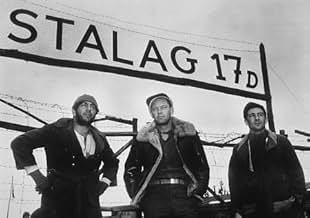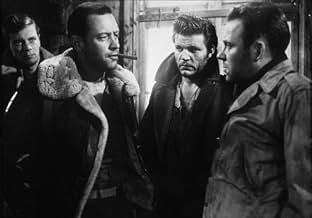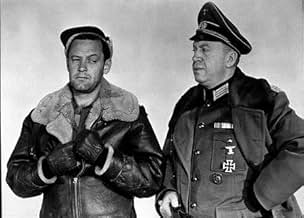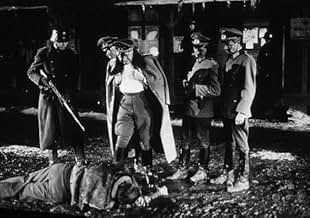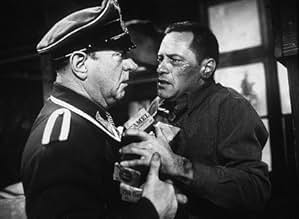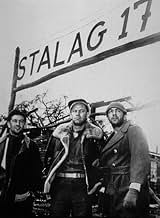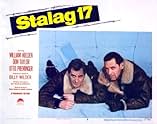VALUTAZIONE IMDb
7,9/10
60.499
LA TUA VALUTAZIONE
Quando due prigionieri americani in fuga dalla seconda guerra mondiale vengono uccisi, un altro prigioniero di guerra americano, J.J. Sefton, è sospettato di essere un informatore. Alla fine... Leggi tuttoQuando due prigionieri americani in fuga dalla seconda guerra mondiale vengono uccisi, un altro prigioniero di guerra americano, J.J. Sefton, è sospettato di essere un informatore. Alla fine, lui smaschera l'infiltrato che li ha tradito.Quando due prigionieri americani in fuga dalla seconda guerra mondiale vengono uccisi, un altro prigioniero di guerra americano, J.J. Sefton, è sospettato di essere un informatore. Alla fine, lui smaschera l'infiltrato che li ha tradito.
- Regia
- Sceneggiatura
- Star
- Vincitore di 1 Oscar
- 2 vittorie e 8 candidature totali
Gil Stratton
- Sgt. Clarence Harvey 'Cookie' Cook
- (as Gil Stratton Jr.)
Recensioni in evidenza
This absorbing and very entertaining movie creates a believable and interesting cast of characters, puts them into an intriguing story, and uses its settings, props, and other resources very creatively. It is a fine combination of drama and comic relief that stands up very well against anything else of its type. The setting and atmosphere are quite believable, and they make it easy to enter the characters' world.
The opening sequence sets up everything nicely, with most of POW's helping two of the prisoners in an escape attempt, while William Holden as the cynical Sefton separates himself from the rest. Sefton is interesting enough as it is, a man who simply by remaining true to his nature cannot help arousing suspicion and antagonism, and Holden was quite a good choice to play him. The story builds up nicely, with developments coming at a careful pace, and some good stretches of lighter material.
There are numerous interesting characters and good performances among the other prisoners, and in particular Robert Strauss and Harvey Lembeck steal more than one scene with their antics which, though goofy, are also an appropriate complement to the main plot and the setting. The German characters are more stylized, but both Sig Ruman and Otto Preminger make them come to life, and help them fit in seamlessly with the others.
Billy Wilder's direction and the photography also deserve praise. Besides the way that each sequence fits together so nicely with the others, there are several individual scenes and shots that are done in an impressive fashion - not flashy, but creative and thoughtful. The scene with Holden lying on his cot while most of the others sing and celebrate is one particularly good example. There is a wealth of good material throughout, making "Stalag 17" a classic that has lost nothing over the years, and one that can be seen and enjoyed several times.
The opening sequence sets up everything nicely, with most of POW's helping two of the prisoners in an escape attempt, while William Holden as the cynical Sefton separates himself from the rest. Sefton is interesting enough as it is, a man who simply by remaining true to his nature cannot help arousing suspicion and antagonism, and Holden was quite a good choice to play him. The story builds up nicely, with developments coming at a careful pace, and some good stretches of lighter material.
There are numerous interesting characters and good performances among the other prisoners, and in particular Robert Strauss and Harvey Lembeck steal more than one scene with their antics which, though goofy, are also an appropriate complement to the main plot and the setting. The German characters are more stylized, but both Sig Ruman and Otto Preminger make them come to life, and help them fit in seamlessly with the others.
Billy Wilder's direction and the photography also deserve praise. Besides the way that each sequence fits together so nicely with the others, there are several individual scenes and shots that are done in an impressive fashion - not flashy, but creative and thoughtful. The scene with Holden lying on his cot while most of the others sing and celebrate is one particularly good example. There is a wealth of good material throughout, making "Stalag 17" a classic that has lost nothing over the years, and one that can be seen and enjoyed several times.
In defense of this great film "Stalag 17", I would like to say a few things. First of all, William Holden's performance in this film gives this film a very big lead against many other films like it. Holden is a very good actor given a very good role here as Sefton, a soldier that uniquely accepts his situation. The other supporting, and even prominent roles are good but seems "intentionally" underdeveloped for the benefit of not complicating viewers with unnecessary information. The story, consisting of a "whodunit" plot, wartime ordeals, and amusing dialogue between the characters is superb for it's time. All in all, watching "Stalag 17" is at least a fine way to spend your time.
I've read many reviews that say that they were disappointed with this film. Some were annoyed because it wasn't as realistically gritty and tense like "Saving Private Ryan". Well, that's the effect of the Hays Offices (censorship officials of American produced movies during the past). I have to say that although it may have lacked the grittiness of Spielberg's film, it still surpasses "Saving Private Ryan" for it's honest approach to it's characters such as the POW that responds to his wife's letter ("I believe it.") with a certain kind of feeling that can truly be described as honest and the German "Wake up caller" Scherbach's constant joking around with POWs while remaining true to his kommandant's wishes. The 'Animal' and Shapiro characters were obviously created for comic relief but it should only be taken as that, comic relief (Hell, everyone's a comedian and at least they tried). Most anybody that was disappointed with this film were probably disappointed for it's strange association with the TV show "Hogan's Heroes". I must say that I don't care much for that certain show but I do like this film.
I really don't think that any film should ever be compared with another film or a TV show (unless it's a spinoff, then they're just asking for it) no matter how related they are. A movie is a movie on it's own and never with the help of another, no matter the similarities. This is a classic film, worthy of it's praise yet unworthy of it's negative critique. Nobody should let personal opinions be considered flaws. Just watch it, when you have the chance, with an open mind.
I've read many reviews that say that they were disappointed with this film. Some were annoyed because it wasn't as realistically gritty and tense like "Saving Private Ryan". Well, that's the effect of the Hays Offices (censorship officials of American produced movies during the past). I have to say that although it may have lacked the grittiness of Spielberg's film, it still surpasses "Saving Private Ryan" for it's honest approach to it's characters such as the POW that responds to his wife's letter ("I believe it.") with a certain kind of feeling that can truly be described as honest and the German "Wake up caller" Scherbach's constant joking around with POWs while remaining true to his kommandant's wishes. The 'Animal' and Shapiro characters were obviously created for comic relief but it should only be taken as that, comic relief (Hell, everyone's a comedian and at least they tried). Most anybody that was disappointed with this film were probably disappointed for it's strange association with the TV show "Hogan's Heroes". I must say that I don't care much for that certain show but I do like this film.
I really don't think that any film should ever be compared with another film or a TV show (unless it's a spinoff, then they're just asking for it) no matter how related they are. A movie is a movie on it's own and never with the help of another, no matter the similarities. This is a classic film, worthy of it's praise yet unworthy of it's negative critique. Nobody should let personal opinions be considered flaws. Just watch it, when you have the chance, with an open mind.
Stalag 17 (1953)
A far reaching precursor to the Stalag 13 of television's "Hogan's Heroes" and a bracing splash in the face for Americans grasping, still, the repercussions of WWII, "Stalag 17" was and is sharp, funny, and compact. On one simple level, it's enjoyable as a tightly made film, period. The acting, writing, editing, and photography--coordinated of course by now legendary director Billy Wilder--snaps like a whip, and two hours goes by fast. A host of minor actors pull of major performances, and the one really big name, William Holden, has the most unusual role, and he gives it an unfriendly edge that really helps save the movie.
Save the movie, that is, from a kind of frivolousness. It is, at its core, a really well made sitcom. The situation is a Nazi prison camp, not the kind of place we expect humor. And the comedy comes from making fun of the Nazis, who are always fair game. The reference to "Hogan's Heroes" is no joke, for those who have seen that 1960s series around the same situation (even including a comic Sgt. Schultz). The producers of "Stalag 17" sued the producers of "Hogan's Heroes" and won. But Stalag is not just a comic romp. There are shades of bitterness that reflect a real camp--almost the kind of gallows humor you need to survive a horrible situation. And there is also a serious strand about who you can trust, about finding the traitor on the inside, and about persecuting the wrong man.
Strictly a studio production, this falls just three years after Wilder's "Sunset Blvd"which uses Holden in another embittered role, and which makes fun of studio productions and Hollywood in general. Though based on a Broadway play, it rises above any sense of being set on a stage, and yet it really does not achieve any sense of realism. It's just short of a farce. The narration at the start announces that here, at last, we will have a movie not about the front and fighting, but about prisoners in a prison camp. It announces, that is, that it will be a different kind of WWII film.
And it is. Holden won best actor for his role. Otto Preminger, the great German director working in Hollywood (and bucking the censors there), plays the commandant of the prison. And Peter Graves is another prominent prisoner, a counterpart to Holden. The photography is by none other than the great Ernest Laszlo, and Franz Waxman heads up the music. It's no wonder it's a smart, sharp, snappy film. What it isn't, however, is deep or probing or moving. It's an entertainment, and a great one, but it keeps any larger expectations in check. And so should you.
A far reaching precursor to the Stalag 13 of television's "Hogan's Heroes" and a bracing splash in the face for Americans grasping, still, the repercussions of WWII, "Stalag 17" was and is sharp, funny, and compact. On one simple level, it's enjoyable as a tightly made film, period. The acting, writing, editing, and photography--coordinated of course by now legendary director Billy Wilder--snaps like a whip, and two hours goes by fast. A host of minor actors pull of major performances, and the one really big name, William Holden, has the most unusual role, and he gives it an unfriendly edge that really helps save the movie.
Save the movie, that is, from a kind of frivolousness. It is, at its core, a really well made sitcom. The situation is a Nazi prison camp, not the kind of place we expect humor. And the comedy comes from making fun of the Nazis, who are always fair game. The reference to "Hogan's Heroes" is no joke, for those who have seen that 1960s series around the same situation (even including a comic Sgt. Schultz). The producers of "Stalag 17" sued the producers of "Hogan's Heroes" and won. But Stalag is not just a comic romp. There are shades of bitterness that reflect a real camp--almost the kind of gallows humor you need to survive a horrible situation. And there is also a serious strand about who you can trust, about finding the traitor on the inside, and about persecuting the wrong man.
Strictly a studio production, this falls just three years after Wilder's "Sunset Blvd"which uses Holden in another embittered role, and which makes fun of studio productions and Hollywood in general. Though based on a Broadway play, it rises above any sense of being set on a stage, and yet it really does not achieve any sense of realism. It's just short of a farce. The narration at the start announces that here, at last, we will have a movie not about the front and fighting, but about prisoners in a prison camp. It announces, that is, that it will be a different kind of WWII film.
And it is. Holden won best actor for his role. Otto Preminger, the great German director working in Hollywood (and bucking the censors there), plays the commandant of the prison. And Peter Graves is another prominent prisoner, a counterpart to Holden. The photography is by none other than the great Ernest Laszlo, and Franz Waxman heads up the music. It's no wonder it's a smart, sharp, snappy film. What it isn't, however, is deep or probing or moving. It's an entertainment, and a great one, but it keeps any larger expectations in check. And so should you.
Despite the fact that this movie got made 10 years before the WW II POW classic "The Great Escape", the movie is still known as the 'other' WW II POW movie. While I do admit that "The Great Escpae" is still a better movie than this one ("The Great Escape" is probably one of my favorite all time movies) this movie is a great and classic one as well.
Just like "The Great Escape", the movie knows to create a perfect balance between its drama and comedy. This movie could easily been turned into a heavy war drama but instead a more light approach gets picked, without loosing any of its serious and more dramatic power. It makes the movie entertaining as well as effectively powerful. It can be assumed that "The Great Escape" and its style got inspired by this movie.
The movie is a 'great' portrayal of the lives of American officer POW's, in a German stalag. They try to make the best of it, with very limited resources. Every small thing and things that are out of the ordinary are the things that make them go through their days and is what's keeping them alive. The first halve of the movie isn't even about the William Holden character and he is just one of the boys. It isn't after about halve way through the movie that the story takes to take shape and the main plot of the movie becomes obvious. In advance you would just expect from this movie to be one about POW's trying to escape. But the story is way better written and layered than that though.
But it above all things is also a very well made and especially directed one, by 6 time Academy Award winner Billy Wilder. He also received a directing nomination for this movie. It's a '50's movie but it doesn't feel like one. The movie seems to be ahead of its time with its story handling, directing and just overall style of film-making. The camera-work is especially great and worth mentioning.
William Holden does a great job at portraying a complicated character. At first you just don't know what to think of him and he isn't a very likable character but he slowly turns into a strong and more important character, that starts doing the right thing. Holden also actually won an Oscar for his role in this movie, despite the fact that he never really wanted to do this movie. It was the only Oscar he ever got, which makes it quite ironic.
A great powerful, entertaining classic, which was truly ahead of its time.
10/10
http://bobafett1138.blogspot.com/
Just like "The Great Escape", the movie knows to create a perfect balance between its drama and comedy. This movie could easily been turned into a heavy war drama but instead a more light approach gets picked, without loosing any of its serious and more dramatic power. It makes the movie entertaining as well as effectively powerful. It can be assumed that "The Great Escape" and its style got inspired by this movie.
The movie is a 'great' portrayal of the lives of American officer POW's, in a German stalag. They try to make the best of it, with very limited resources. Every small thing and things that are out of the ordinary are the things that make them go through their days and is what's keeping them alive. The first halve of the movie isn't even about the William Holden character and he is just one of the boys. It isn't after about halve way through the movie that the story takes to take shape and the main plot of the movie becomes obvious. In advance you would just expect from this movie to be one about POW's trying to escape. But the story is way better written and layered than that though.
But it above all things is also a very well made and especially directed one, by 6 time Academy Award winner Billy Wilder. He also received a directing nomination for this movie. It's a '50's movie but it doesn't feel like one. The movie seems to be ahead of its time with its story handling, directing and just overall style of film-making. The camera-work is especially great and worth mentioning.
William Holden does a great job at portraying a complicated character. At first you just don't know what to think of him and he isn't a very likable character but he slowly turns into a strong and more important character, that starts doing the right thing. Holden also actually won an Oscar for his role in this movie, despite the fact that he never really wanted to do this movie. It was the only Oscar he ever got, which makes it quite ironic.
A great powerful, entertaining classic, which was truly ahead of its time.
10/10
http://bobafett1138.blogspot.com/
In his lengthy and eventful career, Billy Wilder created many films that have rightly attained classic status, but his WWII prisoner of war comedy-drama Stalag 17 is arguably one of his best. The scripting is a perfect example of how to marry a tight plot with sharp dialogue and great characters, and the acting is flawless on all counts. While William Holden's performance as the cynical American sergeant rightly won him an Oscar, it is the comic antics of Robert Strauss and Harvey Lembeck that steal the show. And if there was ever a more entertaining ensemble of previously unseen (and sadly subsequently unheard of) supporting players - with the possible exception of Casablanca - I would love to see it. This film predates the more famous WWII pow film The Great Escape by more than a decade, but had Wilder, Holden and company not caused havoc in Stalag 17, the world would never have seen Steve McQueen play the cooler king with such wry aplomb. Stalag 17 is easily one of the finest films of its time, if not of all time, and I would encourage anyone who has never experienced its unique blend of cynicism, comedy, suspense and drama to check it out at the earliest available opportunity.
Lo sapevi?
- QuizWilliam Holden never felt he deserved an Oscar for his performance in this film. His wife felt it was to compensate for him not winning for "Viale del tramonto (1950)."
- BlooperIn at least two scenes, German solders are seen using US Browning 30 cal. machine guns; some still think of it as an error, but the use of captured enemy equipment was common by all sides in the war. A POW compound would be the ideal place to locate captured weapons, with a relatively limited ammo supply, whilst they still served to deter escape.
- ConnessioniFeatured in Paramount Presents (1974)
- Colonne sonoreWhen Johnny Comes Marching Home
(1863) (uncredited)
Written by Louis Lambert
Played during the opening credits
Played on a record and sung by the prisoners of war
Whistled a bit by Gil Stratton at the end
I più visti
Accedi per valutare e creare un elenco di titoli salvati per ottenere consigli personalizzati
Dettagli
- Data di uscita
- Paese di origine
- Lingue
- Celebre anche come
- Stalag 17 - L'inferno dei vivi
- Luoghi delle riprese
- Azienda produttrice
- Vedi altri crediti dell’azienda su IMDbPro
Botteghino
- Budget
- 1.661.530 USD (previsto)
- Tempo di esecuzione
- 2h(120 min)
- Colore
- Proporzioni
- 1.37 : 1
Contribuisci a questa pagina
Suggerisci una modifica o aggiungi i contenuti mancanti



